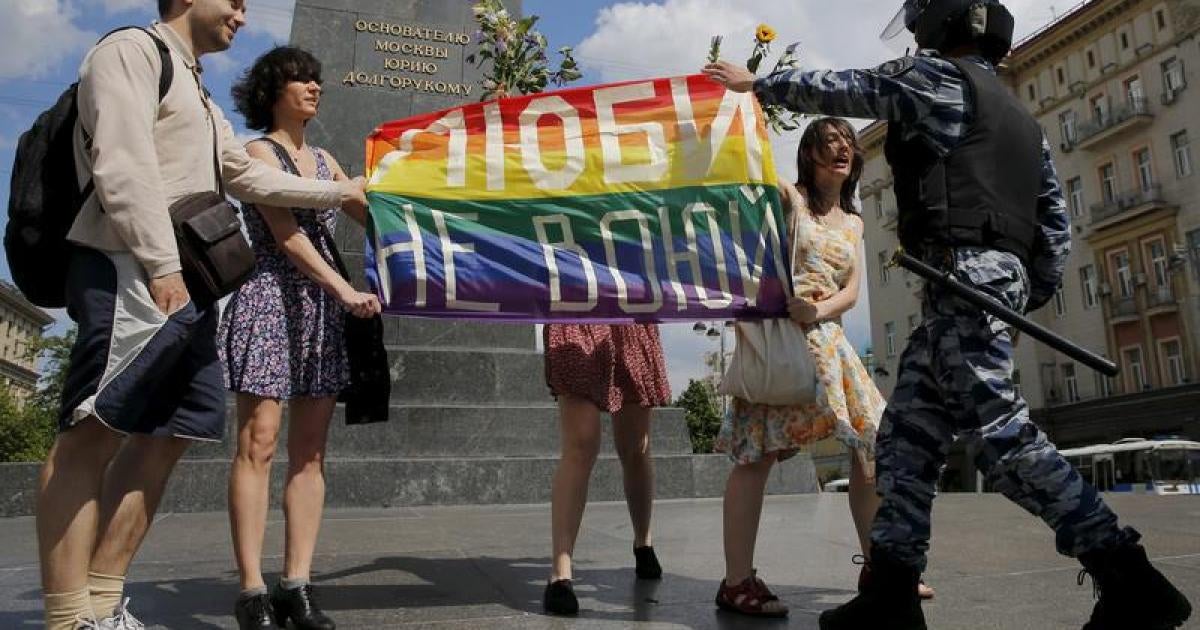
(Tbilisi) – Russia’s State Duma unanimously supported new draft legislation to further restrict freedom of expression regarding sexual orientation and gender identity, Human Rights Watch said today. The proposals prohibit sharing positive and even neutral information about lesbian, gay, bisexual, and transgender (LGBT) people, and publicly displaying non-heterosexual orientations, with hefty fines for noncompliance. The legislation is now pending approval by the parliament’s upper chamber and the president.
The original “gay propaganda” ban, introduced in 2013, purported to protect children from “propaganda,” broadly defined to mean any positive or neutral depiction or discussion of non-heterosexual relations. The draft legislation, while maintaining aggravated penalties when children are involved, extends it to a blanket ban that covers all public information or activities.
The new ban would isolate children from any information on alternative sexual orientation and gender identity, including gender transition. It introduces fines up to the equivalent of US$6,500 for individuals and US$81,000 for legal entities, such as NGOs, for disseminating such information. The draft legislation classifies displays of non-heterosexual relations or orientation as “information harmful to children’s health and development” and provides that websites and other online sources hosting information about lesbian, gay, bisexual, and transgender (LGBT) people can be blocked. The proposed legislation does not provide any exclusions for art, scientific studies, or education. The bill also perpetuates false and damaging messaging that tries to link LGBT people with pedophiles, repeatedly referring to “propaganda of nontraditional sexual relations and (or) preferences, pedophilia, and sex change.”
“The 2013 ‘gay propaganda’ law was an unabashed example of political homophobia, and the new draft legislation amplifies that in broader and harsher ways,” said Tanya Lokshina, associate Europe and Central Asia director at Human Rights Watch. “Just as the original law resulted in significant stigma and harm toward LGBT people in Russia, this updated version will have an even more stifling effect on freedom of expression, well-being and security.”
The 2013 “gay propaganda,” law has been extensively used by the government to stifle pro-LGBT events and to shutdown organizations and online media. The ban clearly violates the right to freedom from discrimination and to impart and receive information, especially with regard to children. This is something that has been extensively documented by Human Rights Watch. The authorities used the legislation to harass children for participation in cultural events as well as for promoting art that teaches tolerance and LGBT-themed posts on social media.
In 2018, the UN Human Rights Committee found the 2013 law to be “ambiguous, disproportionate and discriminatory” and denounced “a blanket restriction on legitimate expressions of sexual orientation.” The European Court of Human Rights reiterated similar conclusions, in particular that “differences based solely on considerations of sexual orientation are unacceptable under the [European Convention on Human Rights]” and that Russian legislation stating the inferiority of same-sex relationships was not justifiable.
In November 2022, after examining Russia’s performance of its rights obligations under the International Covenant on Civil and Political Rights, the UN Human Rights Committee again reiterated its “substantial concern about institutionalized discrimination and stigmatization of LGBT persons”, including through the said law and its proposed amendments, and called for it to be repealed. The UN High Commissioner for Human Rights also urged the Russian legislators to repeal the law rather than expanding it, noting the negative impact of exclusion, stigmatization and discrimination on the society.
The new proposed legislation goes even further in undermining Russia’s obligations under international law to protect freedom of expression and prevent discrimination.
“This law – like its predecessor – doesn’t protect anyone, but seeks to stoke fear and hatred about a minority. It cuts off kids from the services they need to thrive, and in some cases even survive,” Lokshina said. “The proposed legislation and the original ‘gay propaganda’ ban have no place in any society and belong in the trash.”








